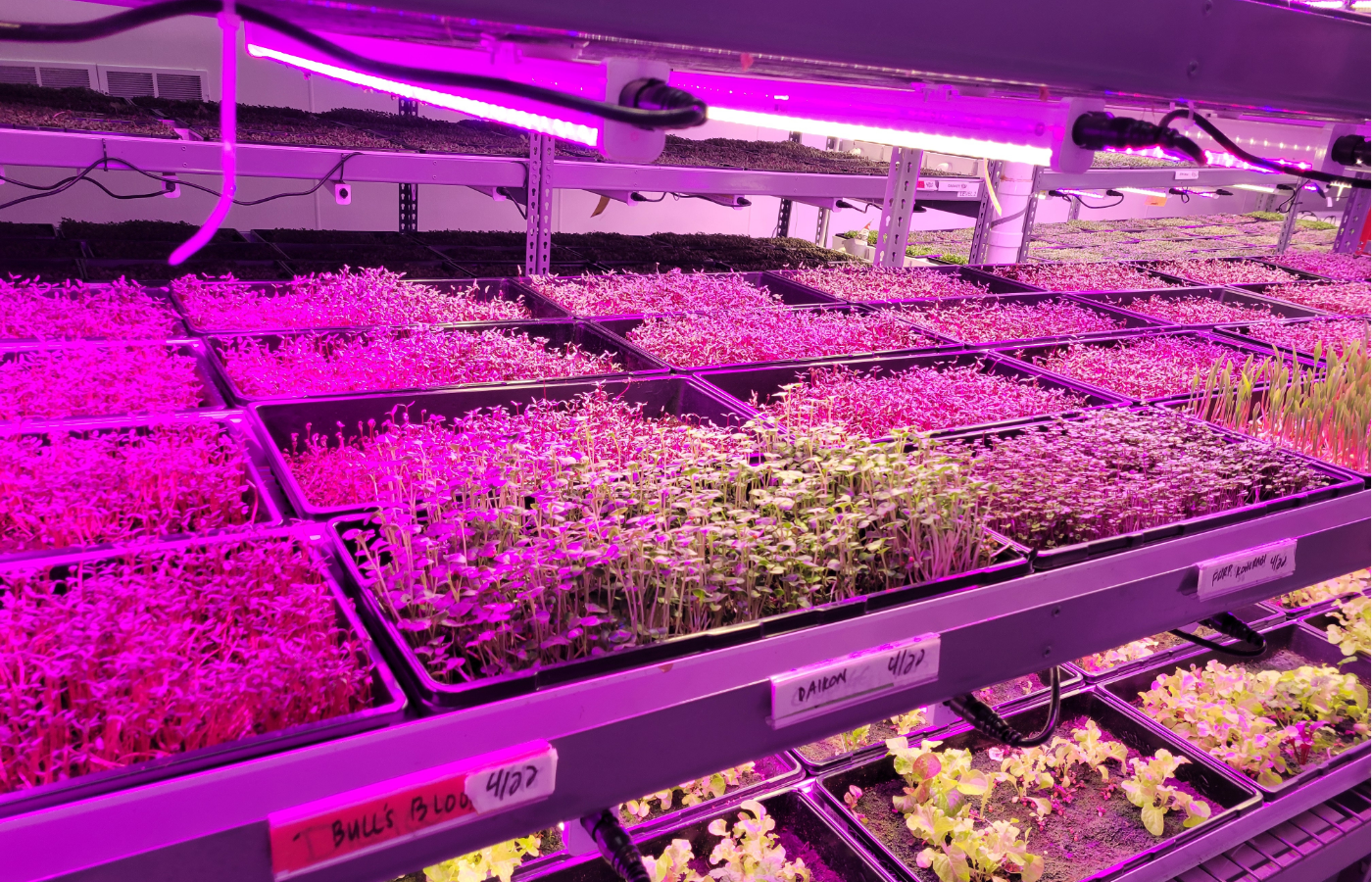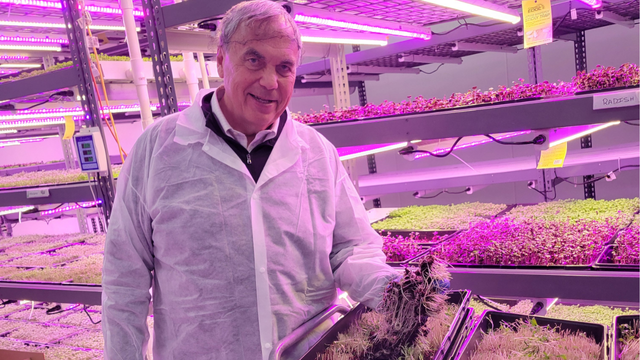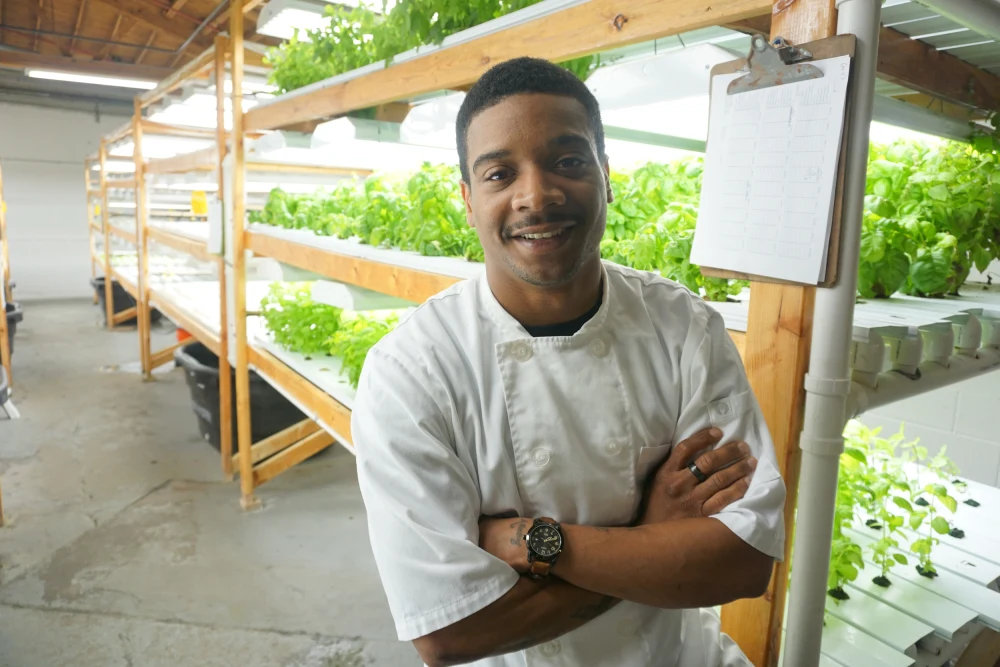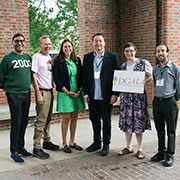A Dartmouth Alum Cultivating Change: Mark Thomas ’74 and Garfield Produce Co.
How one alum's retirement business is changing lives in Chicago—one plant at a time

Sep 30, 2024
5 minute read
Courtney Hall
5 minute read
Mark and his wife Judy were looking for an exciting and challenging retirement business. Combining this desire with a drive to create a positive impact on the health of marginalized communities, Mark and Judy decided to start growing microgreens in Chicago’s heavily Black West Side. The business, called Garfield Produce Co., specializes in producing microgreens—young vegetables and herbs harvested in their early stages, packed with powerful nutrients. Today, Garfield Produce is one of the leading suppliers of microgreens for Chicago’s vibrant restaurant scene.

The “Why” Behind Garfield Produce
“We were volunteering with a neighborhood nonprofit through Breakthrough Urban Ministries, which ran homeless shelters—30 beds for women, 30 beds for men—and preschool programs,” Mark explained.
“Our focus was on East Garfield Park, about three miles directly west of downtown Chicago. Through this involvement, we discovered that individuals transitioning from homelessness to job readiness had extremely limited local employment options. Some had to travel up to two hours by public transportation each way for a minimum-wage job. That’s when we thought, why not start a business in the neighborhood?”
As they explored potential business opportunities, they noticed many vacant buildings that had once been used for light manufacturing. Also, after connecting with their original partner, a DePaul University MBA student who also happened to be an engineer, they were introduced to the concept of hydroponics—growing crops using nutrient-fortified water and artificial lights instead of soil.
For Mark, the idea also later struck a Dartmouth-related chord. He learned that his contemporaries, members of the Dartmouth Classes of 1973 and 1974, became alarmed when they realized that many of their African American classmates were dying prematurely. In response, they embarked on a class project to study the phenomenon, hoping to understand the cause of this disparity and to find ways to help bridge the gap. With Garfield Produce, Mark had always wanted to make a difference in a way that would help combat devastating health disparities. He believed that growing the superfood microgreens in Garfield Park would be a step in the right direction.

After learning more about the practical and financial feasibility of indoor hydroponic agriculture, Mark thought “This is the future. I’m all in.”
In February 2014, they signed a lease on a 100-year-old, 5,000-square-foot manufacturing building just a block from Breakthrough’s men’s shelter. It took another nine months to obtain the necessary licenses and prepare the space for growing. By November of that year, Garfield Produce received its wholesale food establishment license from the City of Chicago and was ready to start growing and selling hydroponic vegetables and herbs.
Mark and Judy were not plant experts before taking on the project. “People often ask, did we know anything about horticulture or farming before this project? The answer is “No,” Mark said. “Judy had a better sense of what we were getting into, but we both learned far more than we ever expected.”
Were you concerned about being perceived as outsiders in the neighborhood?
“We were sensitive to that concern, Mark shared. “We did not want to be perceived as trying to be ‘white saviors.’ For this reason, one of the keys to our success was the advice we received to engage with the community first. We spent six months working at food pantries in both Englewood on the South side of Chicago and East Garfield before doing anything else. This allowed us to get to know the community better, understand their needs and concerns, and earn their respect.”
“We also recognized that the area was a food desert with limited access to affordable, nutritious food. So, we decided to focus on selling to the city’s restauranteurs and caterers, who were willing to pay a premium for high-quality products. This revenue allowed us to hire people from the local community. And when we had surplus produce, we donated it to local food pantries.
“Amid all this, we were fortunate to receive a $500,000 loan from the MacArthur Foundation. Our original partner Steve left to join a startup out west, but that is when we found Darius.”
Ex-Con Turned Master Grower
Darius Jones was convicted of a felony as a teenager. Born and raised in East Garfield Park, Darius’s journey into urban agriculture began after spending almost two years in maximum security at Cook County Jail in 2010.
He waited a year and a half for his trial, and when it finally came, he pleaded guilty. His felony sentence was to be worked off through a work program that included an agricultural focus.
“During my time in max, I only went outside twice,” Darius told NBC News. “When the opportunity to work outdoors came, I jumped at it.”

Darius worked at the Chicago Botanic Garden’s Urban Agriculture Department, maintaining a small composting operation. Over time, he earned certificates in various sustainable agriculture disciplines, gaining valuable experience across the city. Eventually, he found his way to Mark and Judy and the Garfield Produce team, where he became Vice President and General Manager. In his role, Darius found inspiration in creating opportunities for young people from his neighborhood.
“I’m excited to have the opportunity to hire guys who were like me when I was 19 or 20,” he said. He also emphasized the importance of giving people a second chance and hiring those with felony records.
At Garfield Produce, Darius worked alongside Mark, Judy, and the rest of the crew to continue to build the business and ensure its success in Garfield Park. Darius Jones has moved on; but his lasting impact on the business is clear today in the business’s commitment to producing the best product possible while remembering the original vision for the endeavor. After his departure, the enterprise still employed several people of color from the neighborhood, offering equity ownership to management in the business as an incentive to inspire others to pursue their entrepreneurial dreams. Over 60% of its employees have/had felony records.
Garfield Produce Today
While Garfield Produce is no longer under the ownership of Mark and Judy Thomas, the business still thrives in Garfield Park, employing members of the community as Mark and Judy originally envisioned. The couple decided to transfer ownership of the farm to a Black-run Illinois nonprofit, which is now responsible for the operation and growth of the business. This nonprofit is not only continuing the mission of Garfield Produce by providing nutrient-rich microgreens and employing local community members, but they are also exploring ways to replicate the business model in other urban areas.
By expanding to new locations, the nonprofit hopes to address food insecurity in other neighborhoods while offering job opportunities and skills training in sustainable agriculture. Garfield Produce is poised to continue its mission of making a lasting impact on underserved communities through the power of urban farming.
What advice would you give to Dartmouth graduates who are also inspired to use their passion to create a “for-good” business?
“It’s difficult. It takes a lot of grit and always remembering your ‘why.’ Many Ivy League graduates think about joining a board, for instance, as a way to be involved in a cause or mission. But doing what we did with Garfield Produce takes significant, personal commitment and hands-on involvement.
It’s important to remember that your Dartmouth credentials will give you credibility, especially with potential donors or investors. You can take advantage of your credentials and use the alumni network to help you do something that may make a real difference in the world. So, keep up your contacts. I would also tell students and alums that once you are making a good salary in something like consulting, finance, or law, it’s increasingly difficult to take the leap to do something different like this. But it can be done if you are committed to your vision.”
To learn more about what’s going on at Garfield Produce today visit their website.






